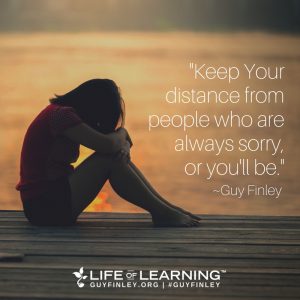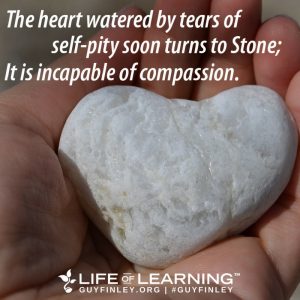Whenever we get caught up in some pain—and start complaining or crying about it—we actually believe (albeit totally unconsciously) that what we are telling others and ourselves is based in reality itself. In these same moments our stated belief—that we are somehow inescapably compromised—or impossibly incomplete—is strengthened because someone is looking at us and sending along the unspoken message, “Oh yes, poor you!”
But, if we wish to break free of any such codependent pattern, we must take a deliberate step back from our own practiced stage performance, and choose instead to witness what’s actually taking place as a result of our act.
For example, we must see that whenever we consent to, or otherwise agree with anyone’s dark assessment of his or her life, we are effectively telling this person, “Yes, that is true and, sad to say, what else can you do besides lament in the way you do?” Our actions and sentiment hide a secret message that silently says: “Sure . . . given your present conditions I understand the prison you are in; it’s only natural for you to feel like a captive!”
But the real reason we lend this willing ear to others (who depend upon us to believe in their story) isn’t because we’re really that concerned, or otherwise compassionate. Truth be told, the underlying motive behind our appearance––dare we choose to see it––tells another story altogether.
We enable others in situations like these because we’re afraid of how negatively they’ll react if we don’t agree with their side of the sad story. Implicit, but never spoken in all such conversations between secret codependents, is something like this:
“Look, what I am telling you now is true, so whatever else you may do, don’t challenge this view I have of my life. And if you don’t agree with my conclusions, then I will take your noncompliance as a threat, and treat you accordingly.”
Haven’t we all been on both sides of uncomfortable moments such as these? Of course we have, which sets the stage for the following key lesson:
The self that feels itself at risk in these times—the unsure self that not only looks for, but attaches itself to codependent relationships—cannot possibly be the real you.
Let’s see why this has to be true:
Who you really are, your True Self quietly knows that you are here on this earth to grow, to realize through life’s innumerable lessons your own highest possibilities. We all feel this constant nudge to know the truth of who and what we are in reality; it’s a tireless longing for that touch of some greatness not yet known, but never far from sight. And since the existence of this higher self-possibility is universally, timelessly acknowledged as being true, then it follows: your life is not—cannot be—about agreeing to live with self-imposed limitations.
The suffering inherent in any painful, or otherwise codependent relationship, is due to one thing: it is the destructive effect of our having forgotten who we really are. Why else would we so anxiously seek the approval of others as the measure of our worth or, conversely, be so easily crushed by someone who withholds a smile from us? When we don’t know who we are, we look to anyone, everyone to tell us; accordingly we are defined and—without ever knowing what’s happened to us, we find ourselves confined by our (unconscious) consent to see and to value ourselves through the eyes of others.
We have uncovered the root cause of codependency, whatever form it may take in one’s life: Our True Self sleeps, which means we are left with only two possible choices if we wish to break the bonds of dependency: either we do the interior work required to wake up and remember who we really are—that we might reclaim our innate independence—or, we continue to create and then enter into false relationships that hold us as unwitting captives.
http://www.relationshipmagicbook.com

